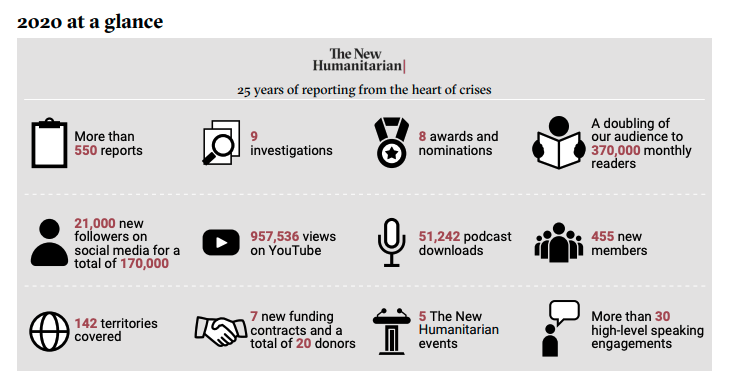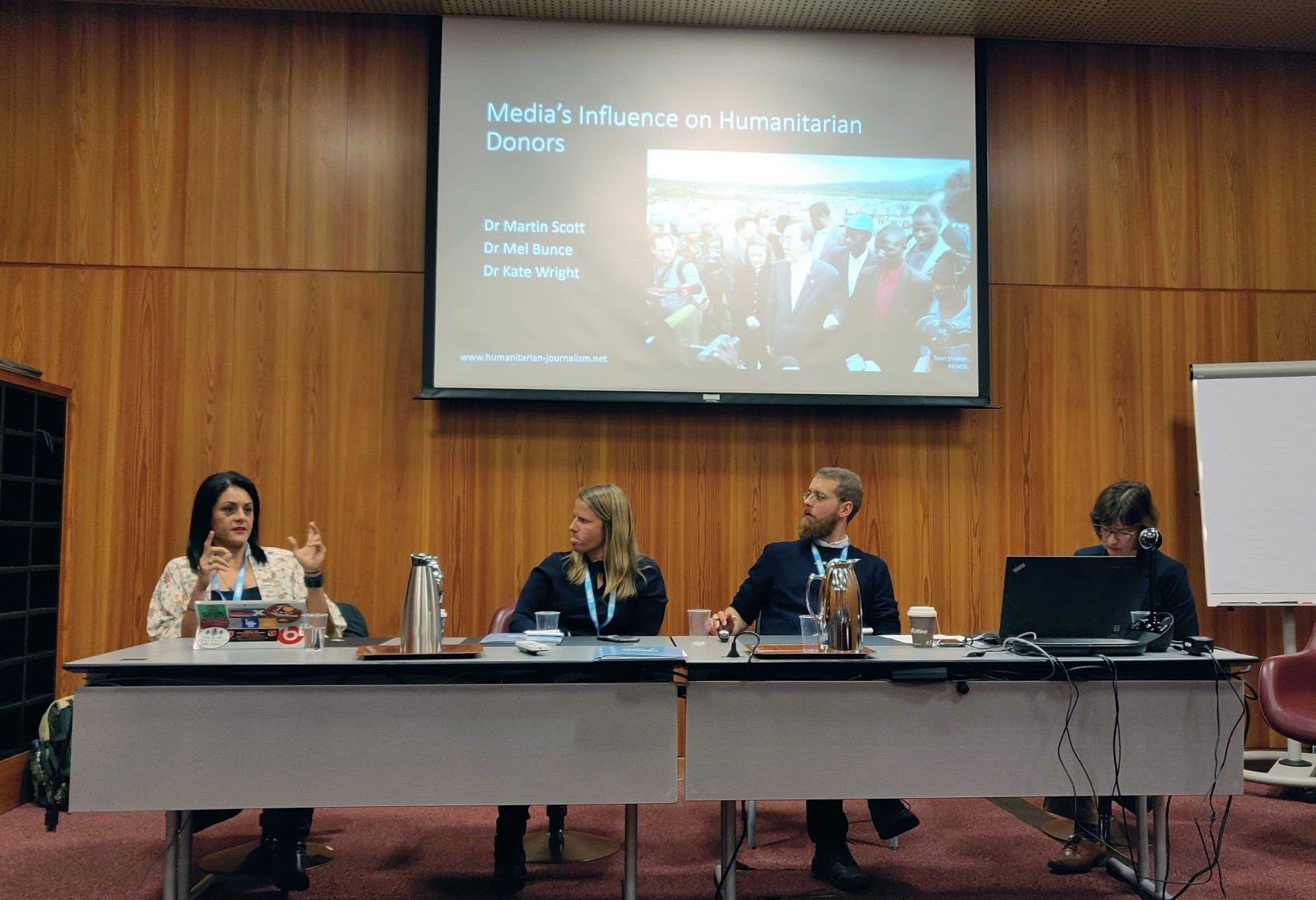The New Humanitarian Annual Report 2020
2020 has been – by all definitions – an intense year.
The COVID-19 pandemic and an awakening to the systemic racism at play in many of the world’s institutions have caused profound suffering and exposed deep-rooted injustice.
These world-changing events have also raised fundamental questions about the beat The New Humanitarian covers. The pandemic has highlighted the scale of the challenge in responding to humanitarian needs that are now worldwide. What do you do when the whole world is in crisis?
And the police shootings of unarmed black men in America have forced us to re-examine what counts as a humanitarian crisis and the implicit biases that underlie such definitions.
Our work over the last year has sought to examine these questions – amid difficult circumstances for our staff and our organisation (though we count ourselves among the lucky ones).
But 2020 has also presented some rays of light, including a revived solidarity among people on different corners of the Earth – all experiencing (albeit to differing degrees) the same global crisis; a new consciousness about the importance of understanding such crises; and an opening for us to interest wider audiences in the business of saving lives.
2020 was also our 25th anniversary – an opportunity to reflect on our rich legacy to date but also to challenge the humanitarian aid sector we cover to think critically about what it has achieved since the Rwandan genocide a quarter century ago and what lessons it can draw for the future.
Somewhat paradoxically, The New Humanitarian took great strides forward in 2020. As you’ll read, we have emerged from this past year stronger than we went into it, and are re-energised by the renewed relevance of our mission and the important work that lies ahead.
Downloads: The New Humanitarian Annual Report 2020 | Executive Summary
Thriving during a difficult year
The COVID-19 pandemic has been described as an “extinction event” for journalism. But in a year when many news organisations had to lay off staff, take pay cuts, or shut down altogether, The New Humanitarian not only weathered the storm, but went from strength to strength.
In 2020, our humanitarian beat took centre stage globally, amid COVID-19 and a worldwide fight for racial equality, as well as the ongoing effects of climate change and global migration.
And yet despite this renewed recognition of the importance of reliable information about crises, such journalism remains under-serviced, as demonstrated by our 2020 reader survey.
As one of the only newsrooms worldwide specialising in reporting on crises through a network of reporters on the ground, The New Humanitarian has attracted new readers and supporters alike with the nuance, balance, and depth of our work.
In 2020, we more than doubled our audience year on year; we increased our income at a time of funding cuts; we signed up some 500 readers to become members, directly supporting our journalism with both their donations and their ideas; and we grew our staffing to meet the increasingly urgent need for our journalism.
We bucked many of the negative trends seen across the journalism sector, and proved that non-profit media that offer a clear public service and are valued by their readers can be resilient in the face of challenges.
Our agile, globally distributed team and network of journalists in some 60 countries around the world enabled us to continue reporting when other media organisations were hamstrung, and when aid professionals were often unable to travel to assess the realities on the ground for themselves. We provided essential information to policymakers about the impact of the pandemic on communities in the Global South, when usual channels of information were no longer working.
Our funding model shielded us from the economic shock of significant drops in advertising revenue, and a newly launched membership programme became the latest of our revenue diversification efforts.
Finally, our track record for accuracy made us a trusted source for local people in countries like Tanzania, Yemen, and Peru, amid deadly dis- and mis-information about the virus, as well as government cover-ups about its real toll.
The New Humanitarian has emerged from COVID-19 stronger than we went into it.

Our journalism in 2020
The New Humanitarian’s journalism seeks to do three things:
|
Provide in-depth, field-based perspectives on humanitarian crises
|
Shine a spotlight on forgotten stories and emerging trends
|
Cast a critical eye over the emergency aid sector
|
Our impact
In 2020, our coverage of humanitarian crises informed decision-making in the interest of those most affected at the highest levels. For example, our reporting of the refugee crisis in Bangladesh served as evidence in a petition by Rohingya victims’ lawyers to the International Criminal Court, and our analysis of lessons from past pandemics and epidemics helped to shape NGO strategies for responding to COVID-19.
We provided greater accountability and transparency in the aid sector: In one investigation, we uncovered claims by more than 50 Congolese women that they were sexually abused and exploited by aid workers during an Ebola outbreak in the Democratic Republic of Congo, prompting investigations from several of the NGOs and UN agencies involved. The story reached a global audience with coverage in major publications around the world, from the New York Times to the BBC. A separate investigation looked into accusations of racism, abuse, and misconduct against the Sudan office head of one of the world’s leading charities. He was finally fired just as we were about to publish.
Our Rethinking Humanitarianism series drove a range of existential conversations about the aid sector, including around its neo-colonial roots, the push for decolonisation, and emerging models for the future. These conversations continued across various channels, and we were soon fielding at least one request per week for speaking engagements on these themes at conferences, boardroom meetings, and humanitarian network events. For example, Director Heba Aly gave a keynote speech to launch Humentum’s OpEx365 – a year-long series of virtual learning for the global development community to re-imagine their work – on how the pandemic and the Black Lives Matter movement have transformed traditional conceptions of humanitarian aid.
By making humanitarian issues more accessible to a wider audience, we raised awareness of forgotten crises and inspired further support: One reader, for example, donated money to a woman featured in our report on Venezuelan migrants facing rising xenophobia in Latin America.
Our audience
In 2020, we saw a remarkable increase in average monthly website users to 370,000, up from 170,000 in 2019. This growth was partly a response to the pandemic – during which audiences worldwide sought out information they could trust about the virus – but it was also due to: improvements in the quality of our journalism, including our cornerstone investigations; growing clout within the news media landscape; increased outreach efforts, including on social media; distribution partnerships to reach new audiences; efforts to engage more with our readers through events and newsletters; and continuous improvements in our use of multimedia and technology.
We launched a membership programme in May, allowing our readers to become part of a community that believes in our work and supports it financially. Members have access to our staff, to exclusive products and events, as well as to each other. By the end of the year, almost 500 members had joined our nascent programme.
We also launched our first podcast, Rethinking Humanitarianism, in collaboration with the Center for Global Development, with more than 50,000 downloads of the first season and great feedback from our listeners. We ended the year with 170,000 social media followers, as well as close to one million views of our videos on YouTube.
Establishing our place in the media sector
We raised our profile in media circles in 2020 by strategically partnering with a number of key media organisations. We co-published reports with the Associated Press (AP), Agence France-Presse (AFP), the Thomson Reuters Foundation, and The Independent. We also partnered with News Deeply to host their archives on our website, in a new space called “Deeply Humanitarian”.
Our work was featured in the Global Investigative Journalism Network, The Guardian, and Foreign Policy. Interviews of our editors and correspondents were carried out by BBC Radio 1, Euronews, France24, Al Jazeera, and Australia’s ABC radio, among others.
Finally, The New York Times, The Washington Post, Foreign Policy, The Guardian, Le Monde, Deutsche Welle, The Mail & Guardian, Yemen Online, and Human Rights Watch were among those who republished, cited, and/or linked to our reporting.

Director Heba Aly speaking at the Humanitarian Networks and Partnerships Week in February 2020.
Our funding
In 2020, our overall income was CHF 2,054,670 and our total expenditure was CHF 1,980,722. This represents a slight increase in our funding levels compared to 2019, with 20 partners (listed here) supporting our work. We also struck several new multi-year funding agreements, which now account for more than 90 percent of our overall funding. No one donor contributed more than 25 percent of our overall budget.
Unearmarked funding accounted for 84 percent of our overall income in 2020, an increase from 66 percent the year before, allowing more coherent coverage and flexibility to adapt to a changing news environment.
Through individual donations, speaker fees, and the launch of our membership programme, we generated more of our own independent revenue, allowing us to continue building reserves and providing greater sustainability for our organisation.
Our organisation and governance
We made great strides in our policies and procedures in 2020, with the development of a child safeguarding policy, an independent complaints platform, and a remuneration framework providing an evidence base to our staff salaries.
We hired a newsroom administrator, an audience engagement editor, and a policy editor to improve the quality of content we produce both in our journalism and across our social channels.
Dr. Joanne Liu, a paediatrician and former international president of Médecins Sans Frontières, joined our board of directors. Currently practising as a doctor in Canada during the COVID-19 response, Dr. Liu is a member of the independent panel (IPPR) examining how the World Health Organization and countries handled the COVID-19 pandemic.